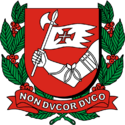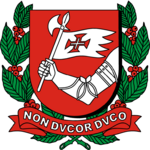Council of State (Belmonte): Difference between revisions
mNo edit summary |
mNo edit summary |
||
| Line 47: | Line 47: | ||
}} | }} | ||
{{Politics of Belmonte}} | {{Politics of Belmonte}} | ||
The '''Council of State''' ({{wp|Portuguese language|Luzelese}}: ''Conselho de Estado''), also known as '''State Council''', is the {{wp|Advisory board| | The '''Council of State''' ({{wp|Portuguese language|Luzelese}}: ''Conselho de Estado''), also known as '''State Council''', is the official {{wp|Advisory board|advisory body}} of the [[President of Belmonte]] in the exercise of his or her tenure as {{wp|head of state}}. | ||
==History== | ==History== | ||
The origins of the State Council started after the [[ | The origins of the State Council started after the [[1836 Revolution]] and the creation of the [[Third Belmontese Republic|Third Republic]], where it was agreed by both [[Conservative Party (Belmonte)|conservative]] and [[Liberal Party (Belmonte)|liberal]] politicians in the [[Riachuelo Agreement]] to strip most of the {{wp|Presidential system|presidential powers}} in favour of a {{wp|parliamentary system}}, however, the role would remain influential as a mediator of conservative and liberal interests, leading to the need of the creation of a advisory council with members from [[List of political parties in Belmonte|both parties]] to advise the president on political matters and ensure its {{wp|Nonpartisanism|non-partisan role}}. | ||
At the time, the council was composed of the president, the [[Premier of Belmonte|premier]], the presidents of both houses of [[National Congres of Belmonte|Congress]], the president of the [[Supreme Court of Belmonte|Supreme Court]], representatives of the [[Belmontese Armed Forces|Armed Forces]] and five members appointed by the | At the time, the council was composed of the president, the [[Premier of Belmonte|premier]], the presidents of both houses of [[National Congres of Belmonte|Congress]], the president of the [[Supreme Court of Belmonte|Supreme Court]], representatives of the [[Belmontese Armed Forces|Armed Forces]] and five members appointed by the ruling party and other five members appointed by the opposition, as well as former presidents. Its membership number was relative with the president being able to appoint other members - although with {{wp|Advice and consent|congressional consent}} - changing in size several times. | ||
Throughout the Third Republic, the State Council became one of the main organizations that maintained the [[Riachuelo Agreement|national oligarchic political order]] set by the Riachuelo Agreement, keeping national stability even in moments of | Throughout the Third Republic, the State Council became one of the main organizations that maintained the [[Riachuelo Agreement|national oligarchic political order]] set by the Riachuelo Agreement, keeping national stability even in moments of crisis or larger animosity between both parties. However, with the [[Riachuelo Agreement|breaking of the agreement]] in 1906, most of its functions were rendered useless due to the emergence of a {{wp|multi-party system}} and {{wp|Political polarization|high polarization of politics}} of the period. | ||
The council would be abolished after the [[ | The council would be abolished after the [[1913 Coup]] and some of its functions were absorbed into a powerless [[Cabinet of Belmonte|Cabinet]] during the [[Berquó Era|Berquó regime]]. The State Council was re-established again with the promulgation of the [[Constitution of Belmonte|1935 Constitution]], with a decreased scope of powers as most of the remaining presidential powers were stripped as well. Today, the council is mostly seen as a {{wp|Figurehead|formality}} among Belmontese politics, holding no practical power at all. | ||
==Role== | ==Role== | ||
The State Council acts as the formal advisory body of the President of the Republic over {{wp|Politics|state affairs}}, assisting on | The State Council acts as the formal advisory body of the President of the Republic over {{wp|Politics|state affairs}}, assisting on national matters throughout the term to ensure the role's [[President of Belmonte|constitutional obligations]]. Furthermore, besides being convened when the president seems necessary, the council must meet before the convocation of {{wp|General election|general}} or {{wp|Snap election|extraordinary}} {{wp|Election|elections}}; the appointment or dismissal of the premier, the cabinet, commanders of the Armed Forces and Supreme Court judges as well as the {{wp|Accreditation|accreditation}} of {{wp|Diplomat|diplomatic representatives}}. | ||
==Members== | ==Members== | ||
Revision as of 21:40, 26 November 2022
| Conselho de Estado (Luzelese) | |
| Council overview | |
|---|---|
| Formed | June 18, 1836 |
| Jurisdiction | Belmonte |
| Council executive |
|
 |
|---|
| This article is part of a series on the politics and government of Belmonte |
The Council of State (Luzelese: Conselho de Estado), also known as State Council, is the official advisory body of the President of Belmonte in the exercise of his or her tenure as head of state.
History
The origins of the State Council started after the 1836 Revolution and the creation of the Third Republic, where it was agreed by both conservative and liberal politicians in the Riachuelo Agreement to strip most of the presidential powers in favour of a parliamentary system, however, the role would remain influential as a mediator of conservative and liberal interests, leading to the need of the creation of a advisory council with members from both parties to advise the president on political matters and ensure its non-partisan role.
At the time, the council was composed of the president, the premier, the presidents of both houses of Congress, the president of the Supreme Court, representatives of the Armed Forces and five members appointed by the ruling party and other five members appointed by the opposition, as well as former presidents. Its membership number was relative with the president being able to appoint other members - although with congressional consent - changing in size several times.
Throughout the Third Republic, the State Council became one of the main organizations that maintained the national oligarchic political order set by the Riachuelo Agreement, keeping national stability even in moments of crisis or larger animosity between both parties. However, with the breaking of the agreement in 1906, most of its functions were rendered useless due to the emergence of a multi-party system and high polarization of politics of the period.
The council would be abolished after the 1913 Coup and some of its functions were absorbed into a powerless Cabinet during the Berquó regime. The State Council was re-established again with the promulgation of the 1935 Constitution, with a decreased scope of powers as most of the remaining presidential powers were stripped as well. Today, the council is mostly seen as a formality among Belmontese politics, holding no practical power at all.
Role
The State Council acts as the formal advisory body of the President of the Republic over state affairs, assisting on national matters throughout the term to ensure the role's constitutional obligations. Furthermore, besides being convened when the president seems necessary, the council must meet before the convocation of general or extraordinary elections; the appointment or dismissal of the premier, the cabinet, commanders of the Armed Forces and Supreme Court judges as well as the accreditation of diplomatic representatives.
Members
The Council of State is headed by the President of Belmonte and composed by the following members:
Current members
| Structure of the State Council (Current) | |
|---|---|
| President | Caetano Villa-Lobos (President of Belmonte) |
| Statutory Members | Rita Maurino (Premier of Belmonte) Ricardo Bresser (President of the Supreme Court) Carlos Marinho (President of the Senate) Aline Soares (President of the Chamber of Deputies) João Sócrates (Leader of the opposition) Afonso de Pádua (former president) Raposo Noronha (former president) |
